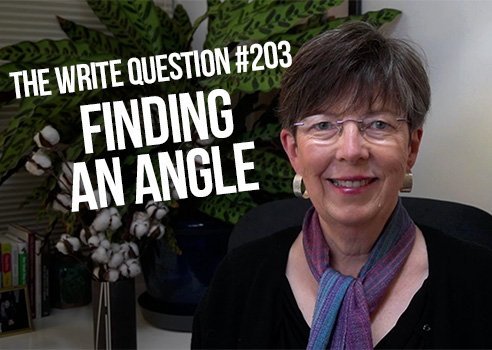Viewing time: 4 mins 21 secs
The Write Question is a weekly video podcast all about writing. Today’s question? How do you find an angle for writing? If you have a question you’d like me to answer you can email me, tweet me @pubcoach, or leave a message for me at the Skype account, The Write Question.
Transcript:
How do you find an angle for writing? That’s the topic I’m addressing today in The Write Question. I’m Daphne Gray-Grant, the Publication Coach.
I have a question from Anne Thibault, a writer based in Belgium. Here’s what she’s asked by email…
“I have a very large, complex topic to write about and I don’t know how to synthesize or structure it. All of my ideas are connected to each other, so I find it difficult to limit the subject and choose an angle. Do you have any suggestions that could help me?”
Thanks for your terrific question Anne. If you want to write quickly, and without pain and agony, it’s essential to understand the difference between a topic and an angle.
I’ve already written a blog post on the subject — see link in the show notes below — and in it I give an example to help make the difference between topics, subjects and angles a little bit clearer.
Let’s imagine you were asked to write an essay about Tennessee Williams’ play The Glass Menagerie. THAT is a topic. It’s vague and it’s unfocused. It gives you too MUCH to write about.
But if you can focus on a SMALL area relating to the play, one that expresses an opinion, you will have an angle. Here are three examples:
- The play’s lack of realism helps Williams make his point powerfully OR
- Abandonment is the play’s key theme OR
- Chekhov had a profound influence on Tennessee Williams
Now, I know your next question is going to be: Well, HOW does one come up with ideas like this?
First, be very aware of your word count. If you have only 500 words, that might be enough to cover the point about lack of realism or abandonment, but it’s not going to be long enough to compare Chekhov and Williams. Considering your word count will help you choose a topic that’s appropriate for the length of your piece. This is a job that will become easier with time and experience.
Second, ask yourself what your readers most need to know. You are not writing for yourself. You’re writing for other people. Be sure to keep that obligation top of mind when searching for an angle.
Third, be prepared to let go of some of your content. Declaring an angle means making choices and saying ‘no’ to some stuff. Remind yourself that you can undoubtedly use some of this abandoned material in future stories.
Fourth, use mindmapping to help yourself. (See the show-notes below for a link to all my blog posts and videos on mindmapping.) And remember, you need a question — not a topic — for mindmapping.
Here’s a good basic question that will work in most cases: “What angle is going to be most interesting to my readers about XYZ topic?” Your answers to that question should be infinitely helpful.
One last tip: If you get the sense that the angles you’re producing are still going to be too big for the number of words you have available, consider turning your piece into a series. It could have two parts, three parts, or even more.
Finally, let me wrap up with the words of the famous crooner, Frank Sinatra: “Cock your hat — angles are attitudes.”
Anne, having an attitude means you have a mindset, a mood, an opinion and a position. A really clear angle is going to make writing so much easier for you. Just be sure to allow yourself enough time for sorting out your angle before you start writing.
*
If you have any writing-related questions, I’d be happy to do a video on them. Just send me a quick email, daphne@publicationcoach.com, or put a note in the comments section of this YouTube channel.
If you’d like to learn more about how to make writing a happier and more rewarding process, check out my latest book Your Happy First Draft. I don’t sell it in bookstores or via Amazon. The only place to buy it is on my website, link on the screen below and in the show notes.


